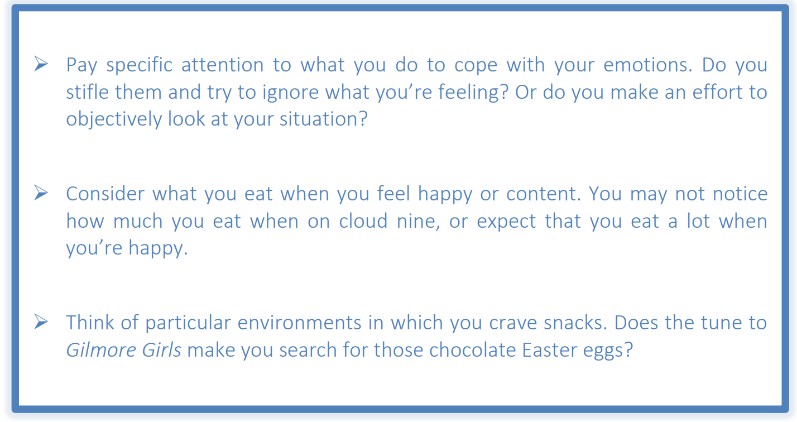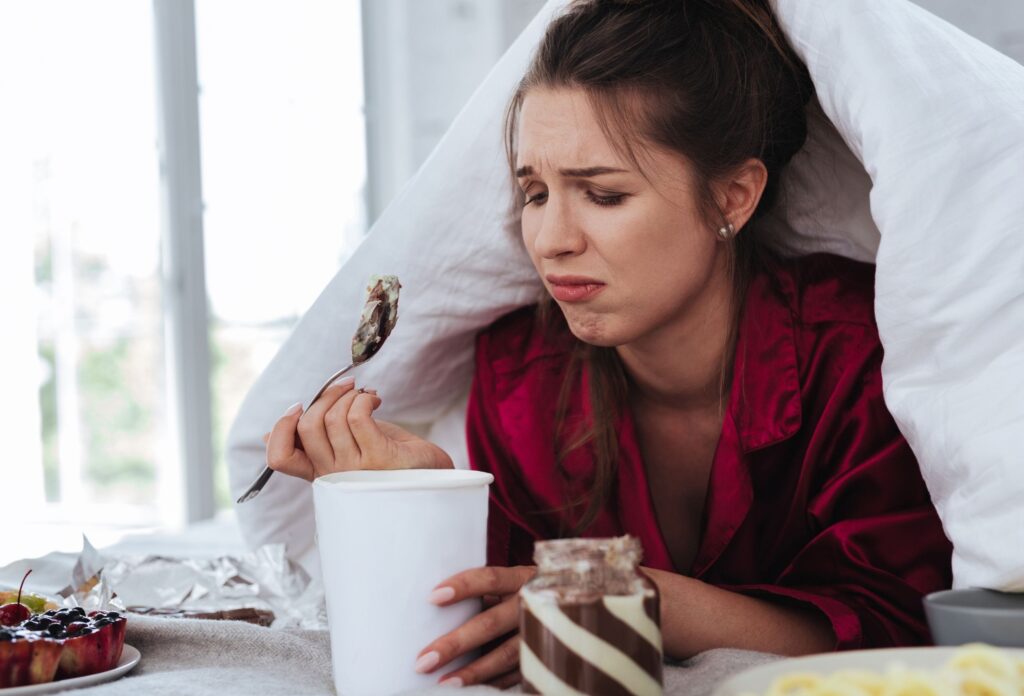The reason might not be as emotional as you think.
You may be especially craving that extra bowl of pasta with Parmesan cheese, and maybe a pint of Ben & Jerry’s too, after you just heard you didn’t get that job you wanted, or failed that test you had to pass. For most people, this is what they think of when they hear the term emotional eating. You too, might have, when reading the title of this article. You’re not to blame: if you type ‘emotional eating’ into Google, most articles that turn up describe it just so. But current endeavors in the field of disordered eating are telling us to change the way we think about emotional eating, uncovering that many of our beliefs are misconceptions.
Also known as comfort eating, the craving for food and (over)consumption of it because of its hedonic value instead of fulfilling the body’s nutritional need is a habit that many recognize. Theorists have coined it a maladaptive coping strategy, which people use to prevent distress, drown out their negative feelings, or as filler to their boredom. A maladaptive strategy, because the surge of guilt you feel after you finish your indulgence obviously does little to improve your mood. After all, not only does your emotional problem remain unchanged, you’ve just added some unnecessary calories and fed your lack of willpower.
Sad or happy eating?
Even in scientific research, emotional eating has been mainly defined as feeding in response to negative affect (Bongers & Jansen, 2016). But is it really only in response to negative feelings that we drown ourselves in calories? Multiple studies say it is not. On the contrary. A study by Bongers, Jansen, Havermans, Roefs, and Nederkoorn (2013) used movie scenes to provoke different moods in university students. Students then took part in a “taste test” with salty crisps and chocolate, but the true purpose of the test was to see how much they ate. Participants described how much they considered themselves emotional eaters by filling out the Dutch Eating Behaviour Questionnaire. When the experiment was over, the researchers compared emotional eaters to non-emotional eaters. What they found was astounding. Emotional eaters ate more snacks when they were in a positive mood than in a neutral mood. Even more striking, is that they didn’t eat more at all when they felt negative emotions, completely opposite to expectations.
A study from the same university used implicit-association tests to make a distinction between emotional and non-emotional eaters (Bongers, Jansen, Houben, & Roefs, 2013). These tests are based on the assumption that we have unconscious associations between particular thoughts or concepts. These associations are reflected indirectly in the speed with which we respond on tasks. After this assessment, all participants got milkshakes whilst viewing short movies that made them feel positive, negative, or neutral. The emotional eaters sipped more of their milkshake, but only when they watched the positive film.
The same results are also found in a real life setting. An experiment conducted at Utrecht University (Evers, Adriaanse, & de Ridder, 2013) asked participants to keep a 7-day diary of their unhealthy snacking between meals. They were also asked to keep track of the emotions they felt before, during, or after they ate. Students reported snacking more often together with positive emotions (on average almost 11 times a week) than with negative emotions (on average almost 4 times a week). As Bongers and colleagues conclude, “in a clinical or real world setting, positive moods might be underestimated as a risk factor for overeating” (2013). But the story doesn’t end here.
Emotional about eating?
As we’ve seen, the image we tend to have of sniffling away our tears and curling up on the couch with our favorite comfort food is not accurate. Not only is there little evidence that emotional eaters eat more due to negative emotions, other studies suggest emotions themselves are not even the culprit. It may be that emotional eaters think about eating and its relation to emotions differently than nonemotional eaters (Adriaanse, de Ridder, & Evers, 2011). In this study by Adriaanse, de Ridder, and Evers, participants filled out surveys that tapped into their thoughts about eating behavior. The emotional eaters worried more about how much food they ate, paid more attention to what they ate, felt less in control over their eating behavior, and more extrinsically obligated to eat healthy. Hence, the fact that emotional eaters overeat could simply be a reflection of their thoughts about eating. What do others think of this?
Emotion-regulation
Besides happy eating and being more emotional about eating, other researchers have proposed that not emotions, but how we regulate emotions influences whether we overeat or not (Evers, Stok, & de Ridder, 2010). The study that set out to test this idea invited female university students to view a scene of the movie American History X. One third of the students watched the scene while using a strategy called ‘reappraisal’. This means that they tried to take a detached bystander perspective, paying special attention to technical details of the movie such as camera angles. Another group suppressed their emotions, and tried to keep a composed face while watching. The last third of students were allowed to use their own strategy. By the end of the experiment, all students could freely ‘taste’ from bowls of chocolate, crisps, and unsalted crackers. Students suppressing their emotions ate more comfort food, regardless of how sad they felt during the film. Apparently, using a bad method to regulate your emotions can in fact make you overeat, even when you don’t feel very emotional.
I guess I just felt sad…
Another possible explanation for why emotional eating is considered sad-eating by many, was brought up just last year. Emotional eaters may think they remember feeling sad when eating, but in reality they might not have felt sad at all (Adriaanse, Prinsen, de Witt Huberts, de Ridder, & Evers, 2016). The study that provided this explanation, manipulated participants into thinking they had eaten much more food during a tasting session than their peers did (also referred to as a ‘false-feedback paradigm’). Emotional eaters thought they had felt much more sad when they ate, even though all students reported the same amount of negative feelings. So do we fool ourselves into thinking the reason we eat is because we are sad?
Conditioned eating
The debate still doesn’t end there. For the last part of the discussion, basic psychology knowledge comes in handy. Remember Pavlov’s dog? Researchers think that the same principle could be applied to (emotional) eating (Bongers, van den Akker, Havermans, & Jansen, 2015). In this 2015 study, two vases with flowers were repeatedly linked to either a chocolate mousse spoon or an empty spoon. The idea being that with each experience of seeing one vase together with chocolate, participants would have more desire to eat if they saw that particular vase again. The study’s findings were not as clear-cut, but one result did stand out. When the final taste test of chocolate mousse was presented, participants who felt negative emotions had more desire to eat when they saw the vase that was previously paired with chocolate. The environment in which you regularly eat when being in a negative mood apparently influences your cravings for food in that environment, but not immediately so (known in psychology as a ‘delayed learning effect’). However, this effect may also plague those of us that are not emotional eaters. You may think this is quite contradictory, after all, we just saw that positive emotions play a larger role than negative emotions. But, these findings suggest that it may not be the negative emotions per se that cause overeating, but their specific link to your environment.
Common phenomenon
So, although emotional eating was long thought of as a strategy used to control and cope with negative feelings or thoughts, it is obviously not that simple. Multiple scientific studies have provided evidence that bouts of emotional eating happen more regularly when people feel happy, instead of sad or tense. But whether to fill emotional needs or not, eating when not hungry is a common phenomenon that can lead to unwanted weight gain and obesity. Emotional eating is even considered to influence weight gain more so than lifestyle behavior (Koenders & van Strien, 2011).
If you think you fall into the category of emotional eater, chances are your eating patterns are sabotaging your quest for health instead of promoting it. If you want to change your ways, you probably wonder what to take home from all the science. Here are some tips to transform your eating behavior:

Although researchers are still at odds of what defines emotional eaters, the search for explanations is currently on the way, and it will continue to unravel the mysteries concerning eating. Remember the tips above at moments that you feel like stuffing yourself. It may be these things that can inform you how to curb your appetite for food that your body does not need.
Further reading
Adriaanse, M., de Ridder, D., & Evers, C. (2011). Emotional eating: eating when emotional or emotional about eating? Psychology and Health,26 (1), 23-39.
Adriaanse, M., Prinsen, S., de Witt Huberts, J., de Ridder, D., & Evers, C. (2016). ‘I ate too much so I must have been sad’: emotions as a confabulated reason for overeating. Appetite, 103 (1), 318-323.
Bongers, P., & Jansen, A. (2016). Emotional eating is not what you think it isand emotional eating scales do not measure what you think they measure. Frontiers in Psychology, 7, 1932.
Bongers, P., Jansen, A., Havermans, R., Roefs, A., & Nederkoorn, C. (2013). Happy eating. The underestimated role of overeating in a positive mood. Appetite, 67 (1), 74-80.
Bongers, P., Jansen, A., Houben, K., & Roefs, A. (2013). Happy eating: the single target implicit association test predicts overeating after positive emotions. Eating Behaviors, 14 (3), 348-355.
Bongers, P., van den Akker, K., Havermans, R., & Jansen, A. (2015). Emotional eating and Pavlovian learning: does negative mood facilitate appetitive conditioning? Appetite, 89 (1), 226-236.
Evers, C., Adriaanse, M., & de Ridder, D. d. (2013). Good mood food. Positive emotions as a neglected trigger for food intake. Appetite, 68, 1-7.
Evers, C., Stok, F., & de Ridder, D. (2010). Feeding your feelings: emotion regulation strategies and emotional eating. Personality and Social Psychology Bulletin, 36 (6), 792-804.
Koenders, P., & van Strien, T. (2011). Emotional eating, rather than lifestyle behavior, drives weight gain in a prospective study in 1562 employees. Journal of Occupational & Environmental Medicine, 53 (11), 1287-1293
About the author
Lisa Cappelletti wrote this postblog.

